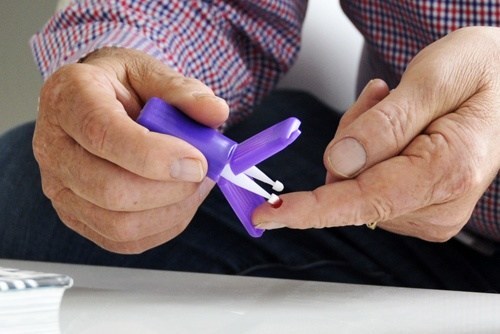
After launching a “serosurvey” to track undetected cases of COVID-19 in the US, the National Institutes of Health (NIH) published a paper in Nature Communications on its serology study for development of an ELISA that detects SARS-CoV-2 antibodies with 99-100% specificity. The protocol defines initial thresholds for IgG and IgM antibodies to determine seropositivity from both clinical and at-home blood samples using the Mitra® device from Neoteryx, with a reduced risk of false positives. To achieve the high levels of specificity and sensitivity needed for such a project, NIH researchers developed two assays to detect the spike protein and receptor binding protein, achieving sensitivity of 100% (95% CI 76.8%, 100%), and specificity of 100% (95% CI 96.4%, 100%). This protocol is key to helping NIH researchers and scientists in other labs and research organizations confidently determine the extent to which the coronavirus has spread undetected, which communities are most affected, and who has developed SARS-CoV-2 antibodies. The NIH researchers are sharing this information so other laboratories can replicate the steps for SARS-CoV-2 antibody testing using both serum and Mitra blood microsamples for similar studies. Labs that wish to adapt and validate this accurate method for SARS-CoV-2 antibody testing can find details in the peer-reviewed paper authored by NIH scientists, “Standardization of ELISA protocols for serosurveys of the SARS-CoV-2 pandemic using clinical and at-home blood sampling,” which published today on the Nature Communications website.
As a next step, NIH research teams at NIAID, NIBIB, NCATS and NCI are analyzing thousands of blood microsamples collected by citizens using Mitra devices in at-home Mitra Blood Collection Kits.
“The NIH ELISA-based serology protocol using Mitra microsampling devices with VAMS technology from Neoteryx gives all scientists a reliable method for identifying SARS-CoV-2 raised antibodies in blood microsamples with amazing specificity, which is critical during the coronavirus pandemic,” said James Rudge, PhD, Technical Director, Neoteryx. “Many tests that were rushed out early in the COVID-19 crisis, did not have the high sensitivity and high specificity necessary to reliably detect key antibodies that indicate an immune response specific to COVID-19 versus some other type of coronavirus. The ELISA protocol from the NIH enables SARS-CoV-2 immunity studies that deliver accurate data, and we’re very proud that our Mitra microsampling devices with VAMS technology supported this impressive achievement.”
Source: Company Press Release






